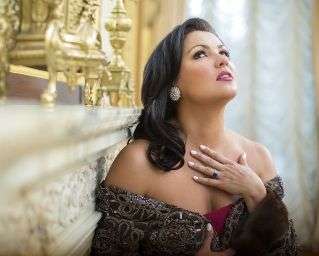|
Back
Netrebko Nails It In New York New York
Carnegie Hall
12/09/2018 -
Serguei Rachmaninoff: Twelve Songs, Op. 21: 5. “Lilacs” & 7. “How fair this spot” – Fifteen Songs, Op. 26: 10. “Before my window” – Six Songs, Op. 38: 5. “The Dream”
Nikolai Rimsky-Korsakov: In Spring, Op. 43: 1. “The lark sings louder” – Four Songs, Op. 42: 3. “The clouds begin to scatter”
Richard Strauss: Four Songs, Op. 27: 4. “Morgen!” – Eight Poems, Op. 10: 3. “Die Nacht” – Five Songs , Op. 41: 1. “Wiegenlied” – Six Songs, Op. 17: 2. “Ständchen”
Claude Debussy: Ariettes oubliées: 2. “Il pleure dans mon cœur”
Gustave Charpentier: Louise: “Depuis le jour”
Pyotr Ilyich Tchaikovsky: Six Songs, Op. 38: 2. “It was in the early spring” – The Queen of Spades, opus 68: “It is evening” – Twelve Songs, Op. 60: 6. “Frenzied nights” – Seven Songs, Op. 47: 6. “Whether day dawns”
Frank Bridge: “Go not, happy day”
Ruggero Leoncavallo: “Mattinata”
Gabriel Fauré: Three Songs, Op. 7: 1. “Après un rêve”
Antonín Dvorák: Gypsy Songs, Op. 55: 4. “When my mother taught me to sing”
Douglas Moore: The Ballad of Baby Doe: “Gold is a fine thing”
Jacques Offenbach: Les Contes d’Hoffmann: “Barcarolle”
Anna Netrebko (soprano), Jennifer Cano Johnson (mezzo-soprano), David Chan (violin), Malcolm Martineau (piano)

A. Netrebko (© Dario Acosta)
It is neither exaggeration nor cliché to say that Anna Netrebko remains the most exciting singer before the public today. Her concert at Carnegie Hall, built around selections about either night or day, came between two other high-power New York engagements in her evolving repertoire, the title roles in Verdi’s Aida and Francesco Cilea’s less well known but equally adored Adriana Lecouvreur, both enthusiastically anticipated role debuts at the Metropolitan Opera. Her demanding solo concert on December 9 stunningly combined much of her new direction in repertoire and stands a landmark in what is already a New York season of unusual excitement.
Netrebko was naturally most at home in the repertoire of her native land. Her round tones and perfect control delivered truly moving performances in the Rachmaninoff song cycle that opened the concert, and in the Rimsky-Korsakoff and Tchaikovsky selections that were interspersed through both halves. It is hard to imagine that she will ever yield these national treasures of Russian art, and that is a good thing. Rachmaninoff’s delicious “Lilacs” yielded especially tempestuous passion from a voice that is expert in conveying it. Dvorák’s “When my mother taught me to sing,” sung in the composer’s native Czech, added a nuanced Slavic element.
Richard Strauss wrote about 200 art songs in addition to his operatic and symphonic output, and Netrebko boldly moved in the direction of his music. Reportedly slated to take on the title role in the composer’s Salome at a future time, she tackled “Morgen!” and “Die Nacht” with full-throttled sound and a roundness of tone that portends great things for the stage. In a similar vein, the Wagnerian depths required by the music of Charpentier, Debussy, and Fauré all turned out equally well, with splendid French diction that has improved since earlier in the artist’s career. The Barcarolle from Offenbach’s Tales of Hoffmann, a duet sung with the capable mezzo Jennifer Cano Johnson, revisited an earlier career triumph. Leoncavallo’s “Mattinata” added a stalwart Italian selection.
Netrebko’s sung English, alas, did not rise to the challenge. Frank Bridge’s standalone song “Go not, happy day” and “Gold is a fine thing,” from Douglas Moore’s underperformed The Ballad of Baby Doe sounded pretty but did not carry linguistically. Given the concert’s temporal theme, one wondered whether she might have done better with Cole Porter’s “Night and Day.”
Paul du Quenoy
|